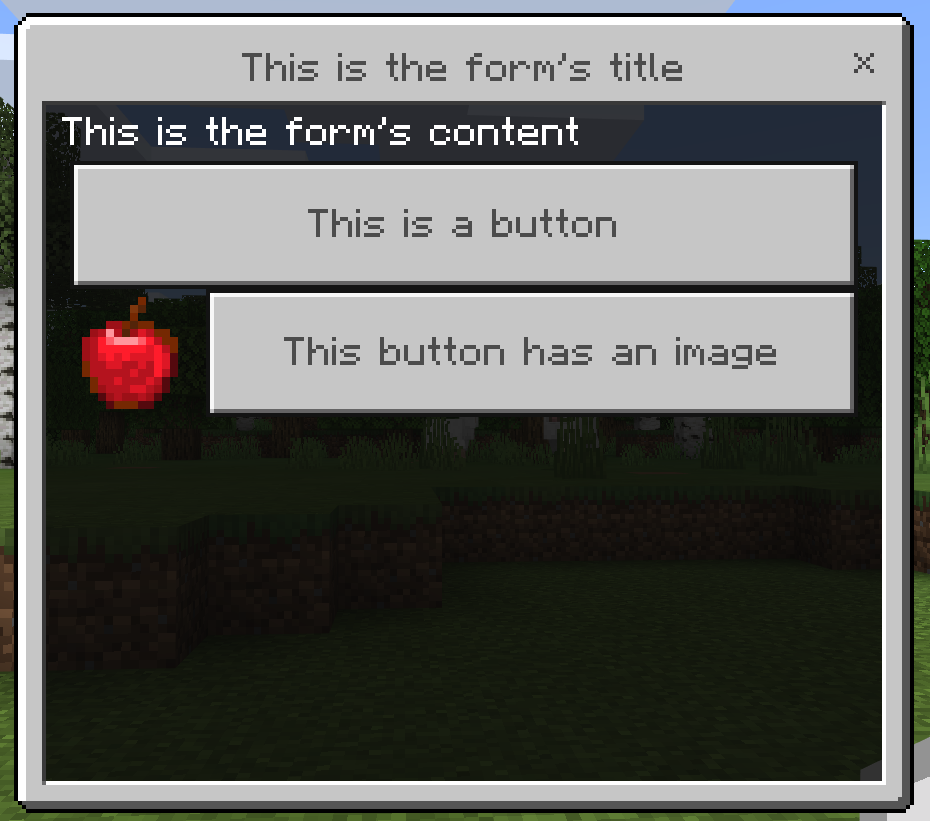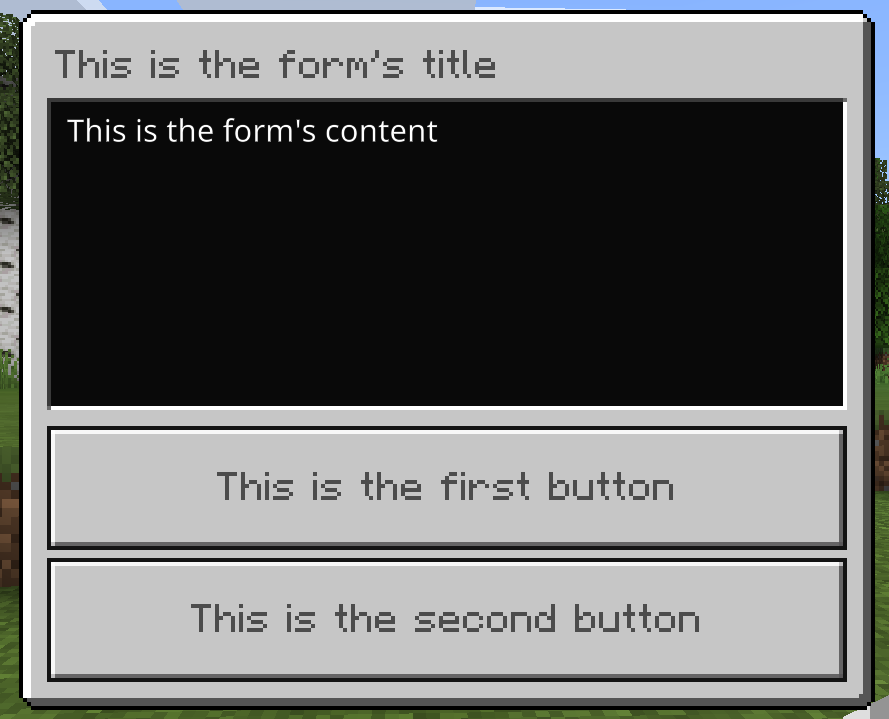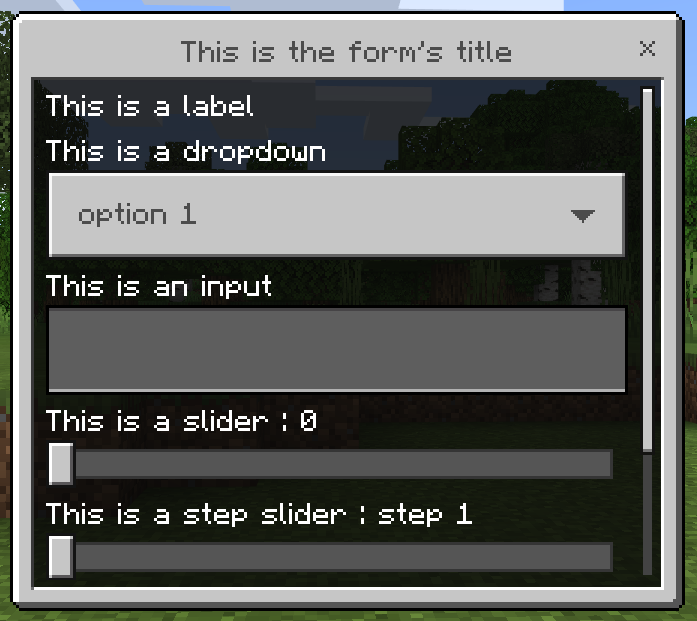There are currently 3 form types in the game :
-
Simple Form
-
Modal Form
-
Custom Form
The three of them have their advantages and disadvantages.
There is no "best" form, it all depends on the use case.
Simple Forms are the most common type of form you'll encounter. They consist of :
-
A title
-
Text content
-
Button(s)
Simple Forms allow you to add as many buttons as you like, and customize them with images (that are next to buttons)
Modal Forms consist of :
-
A title
-
Text content
-
2 buttons
Modal Forms always contain 2 buttons, that cannot have images.
Notice how there is no "cross" to exit the form at the top right, unlike Simple Forms. This is because Modal Forms are usually used for confirmation dialogs (yes/no or similar)
Custom Forms are the most customizable type of form. They consist of :
-
A title
-
A "submit" button that you cannot customize
And plenty of components that you can add to the form :
-
Labels (Text content)
-
Dropdowns
-
Inputs (Text input areas)
-
Sliders
-
Step Sliders
-
Toggles
But... for some reason you cannot add buttons to custom forms. All custom forms have a "submit" button, but you cannot customize it.
Forms are JSON data. With BDSX, there are two manners of generating this data :
-
Writing the JSON data yourself
-
Using BDSX API to generate the data for you
You would think using the API is better. It is indeed simpler but I personnally like to write the data by hand since i find it more readable.
Forms return data after the player interacts with them.
Simple Forms return an integer corresponding to the index of the button the player pressed. If the player closed the form (with the cross at the top right, or by hitting escape for example), null is returned.
Modal Forms return a boolean corresponding to the button that the player pressed. The first button (top one) of modal forms returns true. The second one returns false. Modal forms don't have a cross to close them. However, if the player somewhat closes the form (by hitting escape for example), false is returned.
Custom Forms return an array containing the data of the form's components. Refer to the section below to see what each component returns. If the player closed the form, null is returned.
Description : A clickable button
Provided data :
| Name | Type | Requirement | Description |
|---|---|---|---|
text |
string | required | Text of the button |
image |
json object | optional | Image displayed next to the button |
image.type |
"path" or "url" | required if image is provided | Image type. path : local texture file. url : url of the image |
image.data |
string | required if image is provided | image path or url |
Using BDSX API
form.addButton(new FormButton("This is a button"));
form.addButton(new FormButton("This button has an image", "path", "textures/items/apple"));Using JSON
"buttons":[
{
"text":"This is a button"
},
{
"text":"This button has an image",
"image":{
"type":"path",
"data":"textures/items/apple"
}
}
]Description : Text content
Provided data :
| Name | Type | Requirement | Description |
|---|---|---|---|
text |
string | required | Text to be displayed |
Returned data : null
Using BDSX API :
form.addComponent(new FormLabel("This is a label"));Using JSON :
"content":[
{
"type":"label",
"text":"This is a label"
}
]Description : A dropdown menu letting the player choose an option between different options
Provided data :
| Name | Type | Requirement | Description |
|---|---|---|---|
text |
string | required | Text displayed above the dropdown |
options |
string[] | required | Options to choose from |
default |
integer | optional (0 if not provided) |
Index of the default option |
Returned data :
| Type | Description |
|---|---|
| integer | Index of the chosen option |
Using BDSX API :
form.addComponent(new FormDropdown("This is a dropdown", ["option 1", "option 2", "option 3"], 0));Using JSON :
"content":[
{
"type":"dropdown",
"text":"This is a dropdown",
"options":[
"Option 1",
"Option 2",
"Option 3"
],
"default":0
}
]Description : An input field letting the player input text
Provided data :
| Name | Type | Requirement | Description |
|---|---|---|---|
text |
string | required | Text displayed above the input field |
placeholder |
string | optional | Placeholder text displayed in the input field |
default |
string | optional | Already entered text |
Returned data :
| Type | Description |
|---|---|
| string | Entered text in the input field |
Note : if no text is entered '' (empty string) will be returned.
Using BDSX API :
form.addComponent(new FormInput("This is an input", "placeholder", "text already entered"));Using JSON :
"content":[
{
"type":"input",
"text":"This is an input",
"placeholder":"Placeholder",
"default":"already entered text"
}
]Description : A slider letting the player choose a value between a minimum and a maximum
Provided data :
| Name | Type | Requirements | Description |
|---|---|---|---|
text |
string | required | Text displayed above the slider |
min |
number | required | Minimum value of the slider |
max |
number | required | Maximum value of the slider |
step |
number | optional (1 if not provided) |
Step between values |
default |
number | optional (minimum slider value if not provided) |
Default value of the slider |
Returned data :
| Type | Description |
|---|---|
| number | Value selected by the player |
Using BDSX API :
form.addComponent(new FormSlider("This is a slider", 0, 100, 1, 0));Using JSON :
"content":[
{
"type":"slider",
"text":"This is a slider",
"min":0,
"max":100,
"step":1,
"default":0
}
]Description : A slider letting the player choose between different values
Provided data :
| Name | Type | Requirement | Description |
|---|---|---|---|
text |
string | required | Text displayed above the slider |
steps |
string[] | required | Values to choose from |
default |
integer | optional (0 if not provided) |
Index of the default slider value |
Returned data :
| Type | Description |
|---|---|
| integer | Index of the selected value |
Using BDSX API :
form.addComponent(new FormStepSlider("This is a step slider", ["step 1", "step 2", "step 3"], 0));Using JSON :
"content":[
{
"type":"step_slider",
"text":"This is a step slider",
"steps":[
"step 1",
"step 2",
"step 3"
],
"default":0
}
]Description : A simple (on/off style) toggle
Provided data :
| Name | Type | Requirement | Description |
|---|---|---|---|
text |
string | required | Text displayed above the toggle |
default |
boolean | optional (false if not provided) |
Default toggle value |
Returned data :
| Type | Description |
|---|---|
| boolean | Toggle value chosen by the player |
Using BDSX API :
form.addComponent(new FormToggle("this is a toggle", false));Using JSON :
"content":[
{
"type":"toggle",
"text":"This is a toggle",
"default":false
}
]import {SimpleForm, FormButton} from "bdsx/bds/form";const form = new SimpleForm();
form.setTitle("This is the form's title");
form.setContent("This is the form's content");
form.addButton(new FormButton("This is a button"));
form.addButton(new FormButton("This button has an image", "path", "textures/items/apple"));
form.sendTo(NetworkID, async(data) => {
//data can be processed here
//here, data is the data returned. it contains all the form data.
//Use data.response to get the form response data.
});import {Form} from "bdsx/bds/form";const data = await Form.sendTo(NetworkID, {
"type": "form",
"title": "This is the form's title",
"content": "This is the form's content",
"buttons": [
{
"text": "This is a button"
},
{
"text": "This button has an image",
"image": {
"type": "path",
"data": "textures/items/apple"
}
}
]
});
//data can be processed here
//here, data is the form response data.import {ModalForm} from "bdsx/bds/form";const form = new ModalForm();
form.setTitle("This is the form's title");
form.setContent("This is the form's content");
form.setButtonConfirm("This is the button returning true");
form.setButtonCancel("This is button returning false");
form.sendTo(NetworkID, async (data) => {
//data can be processed here
//here, data is the data returned. it contains all the form data.
//Use data.response to get the form response data.
});import {Form} from "bdsx/bds/form";const data = await Form.sendTo(NetworkID, {
"type": "modal",
"title": "This is the form's title",
"content": "This is the form's content",
"button1": "This is the button returning true",
"button2": "This is the button returning false"
});
//data can be processed here
//here, data is the form response data.import {CustomForm, FormLabel, FormDropdown, FormInput, FormSlider, FormStepSlider, FormToggle} from "bdsx/bds/form";const form = new CustomForm();
form.setTitle("This is the form's title");
form.addComponent(new FormLabel("This is a label"));
form.addComponent(new FormDropdown("This is a dropdown", ["option 1", "option 2", "option 3"], 0));
form.addComponent(new FormInput("This is an input", "placeholder", "text already entered"));
form.addComponent(new FormSlider("This is a slider", 0, 100, 1, 0));
form.addComponent(new FormStepSlider("This is a step slider", ["step 1", "step 2", "step 3"], 0));
form.addComponent(new FormToggle("this is a toggle", false));
form.sendTo(NetworkID, async (data) => {
//data can be processed here
//here, data is the data returned. it contains all the form data.
//Use data.response to get the form response data.
});import {Form} from "bdsx/bds/form";const data = await Form.sendTo(NetworkID, {
"type": "custom_form",
"title": "This is the form's title",
"content": [
{
"type": "label",
"text": "This is label"
},
{
"type": "dropdown",
"text": "This is a dropdown",
"options": [
"Option 1",
"Option 2",
"Option 3"
],
"default": 0
},
{
"type": "input",
"text": "This is an input",
"placeholder": "Placeholder",
"default": "already entered text"
},
{
"type": "slider",
"text": "This is a slider",
"min": 0,
"max": 100,
"step": 1,
"default": 0
},
{
"type": "step_slider",
"text": "This is a step slider",
"steps": [
"step 1",
"step 2",
"step 3"
],
"default": 0
},
{
"type": "toggle",
"text": "This is a toggle",
"default": false
}
]
});
//data can be processed here
//here, data is the form response data.BDSX API allows you to map "labels" to your components. So instead of referring to them by their index, you can map them to a string.
//[...]
form.addButton(new FormButton("This is the first button"));
form.addButton(new FormButton("This is the second button"));Here, if the player clicks the first button, data.response will be 0.
If the player clicks the second button, data.response will be 1.
Now let's map labels to those buttons :
//[...]
form.addButton(new FormButton("This is the first button"), "first");
form.addButton(new FormButton("This is the second button"), "second");Here, if the player clicks the first button, data.response will be "first".
If the player clicks the second button, data.response will be "second".
Nice !
You can map labels to all form components except modal forms buttons.
Written by Se7en for the BDSX community
This code is licensed under GNU General Public License v3.0
Feel free to PR any mistakes/improvements !
if you have any questions add me on Discord : Se7en#9999


